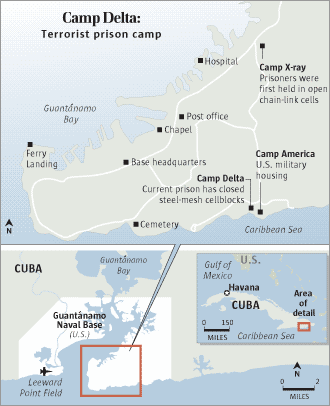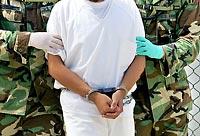— Chapter 2 —
Mission: Guantánamo
Seattle Times staff reporter
Assigned to Guantánamo Bay, Yee gets high marks for advising camp leaders about the ways of Islam and helping cool tensions between detainees and guards.
GUANTÁNAMO BAY, Cuba
November 2002
Tropical heat bore down on Camp Delta as James Yee stepped through the chain-link gate, past a pair of guards, and saw the terrorist prison camp for the first time.
Inside cells cocooned by barbed wire were more than 600 prisoners from at least 40 countries, being held and interrogated with little hope of going home. There were acne-scarred teenagers and white-bearded patriarchs; hardened Taliban fighters and seasoned al-Qaida insiders. "The worst of the worst," Defense Secretary Donald Rumsfeld called them.
But among them, too, officials learned, were bewildered taxi drivers, merchants and others sold to U.S. forces by unscrupulous tribal leaders.
The first 20 prisoners had arrived at Guantánamo 11 months earlier after the U.S. invasion of Afghanistan.
By the time Yee arrived, there had been at least one major hunger strike and seven suicide attempts. Tensions were high. Prisoners complained of prolonged sessions in frigid, air-conditioned interrogation rooms, music blaring, forced by chains to squat on the floor. Even some FBI agents assigned here were growing squeamish, writing secret memos questioning the military's tactics.
For their part, guards complained of being pelted by urine, spit and feces as they patrolled the cellblocks.
It was an uneasy place for a Muslim chaplain, or any service member who shared the faith of the "enemy combatants." Inmates viewed them as traitors to the faith. Guards, made up almost entirely of Army reservists and National Guardsmen, looked on them as sympathizers of the fanatics who had spawned the 9/11 attacks.
GUANTÁNAMO AT A GLANCE

Guantánamo Naval Base
![]()
• Set up by U.S. Marines in 1898 during the Spanish-American War
• U.S. has leased land from Cuba since 1903.
• Area: 45 square miles. Surrounded by ocean, cactus, land mines set up by Fidel Castro to keep Cubans out
• Military nickname: Gitmo
Camp Delta
• First 20 prisoners arrived Jan. 11, 2002; placed in Camp X-Ray.
• Camp Delta replaces X-Ray in April 2002. Delta is made up of six subcamps, including a medium-security ward.
• Prison population about 660 at its height, about 550 today. More than 200 have been released.
• Prisoners come from 40 countries and speak dozens of languages including Arabic, Pashto, Urdu, French and English.
• Cells about 8 feet deep, 7 feet wide and 8 feet tall.
• About 2,800 U.S. service members and civilians representing all five military branches serve at the camp. Most are Reserves or National Guard members.
Sources: Miami Herald, CIA, The Associated Press, Guantanamo Bay Public Affairs
Each of the three Muslim chaplains who had served at the base before Yee had run afoul of the guards to some degree, and one had been investigated on the false suspicion that he had helped prisoners send messages home.
But Yee seemed to have something his predecessors did not. He was a chaplain who had studied in Syria, spoke Arabic, yet had the military bearing of a West Point graduate.
In the year since the 9/11 attacks, he had become the military's most prominent chaplain while stationed at Fort Lewis, briefing soldiers, generals and the media on the tenets of Islam and calling for tolerance within the ranks.
In the fall of 2002, he received orders to report to Guantánamo.
Camp officials quickly realized they had an asset. As the world's eyes increasingly turned to the prison, public-affairs officers called on him to greet visiting media. Who better to show that the U.S. military was treating its captives humanely, and that its fight was against terrorists, not Islam?
Yee's duties included ministering to the dozens of Muslim soldiers and civilian linguists who served at the camp; giving cultural-awareness briefings to incoming soldiers; and providing for the religious needs of the detainees, giving them Qurans, prayer beads and Islamic literature from the prison library.
But his job, first and foremost, was to advise camp leaders when they had questions about their captives' religion or culture.
Maj. Gen. Geoffrey Miller, Joint Task Force Guantánamo's new commander, appreciated the young chaplain, according to officers who served with them. Miller had arrived the same month as Yee, armed with a mission to improve intelligence collection.
Camp officials say that was accomplished by instituting a system of rewards. Compliant prisoners might receive prayer oil, board games or bottled water, a relief from the yellowish desalinated water that flowed from cell faucets. Noncompliant prisoners might find themselves in isolation.
Miller drew a strict line for Yee: He was not to be involved in intelligence work or interrogations. The prisoners would never trust him if he were.
Catering to their spiritual needs had an added benefit.
"The main mission was to collect intelligence," the camp's former superintendent, Command Sgt. Maj. John VanNatta recalled. "Rather than alienate someone to where they're more hostile, we tried to appease them, and also to be more supportive to their religion."
If Yee had concern over how the prisoners were treated, VanNatta doesn't recall him sharing it with camp leaders, nor do friends or family members remember him mentioning it in e-mails and phone calls home.
A visiting Australian Broadcasting Corp. television crew asked Yee if his Islamic beliefs and compassion for the prisoners interfered with his military mission.
"Professionals never allow personal things to affect the way they perform a job," he told them. "If they do, then they're not professional."
Though some military officials would later insist it was never Yee's job to minister to the detainees, it was clear at the time that it was.
Guards remember Yee spending long hours walking through the faded-green cellblocks, handing out religious literature and conversing with the prisoners, usually in Arabic, sometimes in English with the few who understood it.
 Military police escort a detainee at Camp Delta last summer. Defense Secretary Donald Rumsfeld called the Guantánamo detainees "the worst of the worst," but not all of them fit that description. |
What crimes they had committed before their capture was unimportant to him, he told another visiting news crew. His duty, he believed, was to assist the detainees in their worship and in the performance of Islamic rites, prayers and fasts. "Whatever they need to help them get through a difficult time," he said.
Yee settled into Guantánamo life, making friends among his Muslim co-workers. He pushed to have a classroom in the base chapel converted into a mosque for the dozens of Islamic translators and service members deployed there. And he continued the mission he had begun back at Fort Lewis in the days after 9/11 — to educate troops that Islam was a religion of peace.
"Why has it been so difficult for most in our society to distinguish these millions [of peaceful Islamic worshippers] from the extreme fanatical minority?" he wrote in the prison camp's newspaper.
"Why are we still afraid of Islam, the religion?"
His cultural-awareness briefings, required of all incoming U.S. soldiers at the camp, had a similar theme and also stressed that the prisoners were human and should be treated as such.
Forgetting that, he told the newcomers, "becomes very unpleasant for both guards and detainees."
VanNatta, who in civilian life ran the largest prison in Indiana, saw Yee's efforts as more than a personal quest. They had strategic value.
"There's always this mind-set that some people are the enemy," VanNatta later said. "We were from the very beginning trying to change that mind-set, because we had to maintain a more professional standing in order to get intelligence."
VanNatta said he frequently called on Yee to help ease tensions during prisoner uprisings or standoffs with guards. Detainees would bang on their steel-mesh doors with anything handy. One of their biggest complaints was of guards kicking their Qurans, flushing them down the toilets and disrespecting their religion.
After a number of disturbances, Yee was called on to develop culturally sensitive ways of searching cells, particularly when dealing with the prisoners' Qurans. Under the new guidelines, only Muslims were allowed to touch the holy books, except in extreme circumstances.
The rule drew the wrath of some guards. Even VanNatta said it was something he would never offer prisoners at a civilian prison. But Guantánamo was different, and the uprisings subsided once the rules were adopted.
VanNatta wasn't the only camp leader to appreciate Yee's efforts. His performance evaluations were awash with praise, making specific mention of his new guidelines and the calm, deliberate approach to defusing tense situations.
Col. Adolph McQueen, the detention operations commander, stated that Yee should "be promoted at the first opportunity."
But while Yee was winning praise from camp leaders, others were growing suspicious.
Ray Rivera: 206-464-2926 or rayrivera@seattletimes.com
